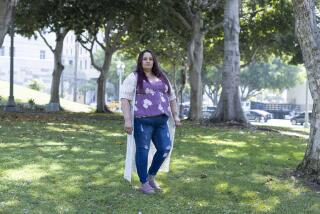N.Y. Warns Drug Agency on Giving Out Needles
- Share via
New York City authorities said Friday that officials of a private drug abuse agency would be arrested if they go ahead with their plan to violate state law and distribute free needles and syringes to the city’s drug addicts as an anti-AIDS measure.
“It is a case of good people heading down the wrong road,” Dr. Stephen C. Joseph, New York City’s health commissioner, said in a telephone interview. In an ironic juxtaposition, Joseph has been urging the state government to approve such a plan, as an experiment, for more than a year.
Joseph, as well as New York City Mayor Ed Koch, called upon the Brooklyn-based Assn. for Drug Abuse Prevention and Treatment, known as Adapt, to reconsider its plans.
“We will not allow people to violate the law with impunity,” the mayor told reporters. “They will be arrested.”
Adapt’s president, Yolanda Serrano, could not be reached for comment. In Friday’s editions of the New York Times, where the controversial proposal was disclosed, Serrano was quoted as saying: “We know whoever does this is going to get arrested, but somebody has to take the first step.”
Beginning in the next several weeks, Adapt said, it will distribute sterile needles and syringes in exchange for used hypodermic needles in drug “shooting galleries” throughout the city.
New York City has an estimated 200,000 intravenous drug addicts. Between 50% and 60% are believed to be infected with the AIDS virus and an additional 5% become infected each year. It is the largest concentration of AIDS-virus-infected drug addicts in the world.
Disclosure of Adapt’s needle exchange proposal is certain to rekindle widespread debate throughout the country, pitting those who believe that everything should be done to stop the spread of the deadly AIDS virus--even if that means condoning intravenous drug use--against those who are morally outraged by the thought of giving drug addicts legal access to sterile needles and syringes.
“On balance, if you make a strictly professional decision and put political considerations aside, you would probably have to start a needle exchange program,” said Dr. Andrew R. Moss of San Francisco General Hospital, who has just completed a study of Western European needle exchange programs for the Robert Wood Johnson Foundation. “But the politics are so horrendous and the evidence of the good you achieve is so small, it is a toss-up.”
In the last year, such programs, including needle exchange and sales of needles and syringes without prescription, have proliferated in Australia and Western European nations, including Britain, the Netherlands and Sweden.
The largest and most extensive needle exchange program is in Amsterdam, where needles are supplied to about 60% of the city’s 2,500 to 3,000 regular intravenous drug users. There is no evidence that Amsterdam’s program has fostered increased intravenous drug use, according to Moss, but also little evidence that it has altered the spread of the AIDS virus.
In the United States, similar projects have been considered and rejected in New York City, San Francisco and New Jersey, although New York City officials continue to press Dr. David Axelrod, the state health commissioner, to approve a pilot needle exchange program.
The Adapt proposal “is something you should expect,” said Dr. Don Desjarlais, the coordinator for AIDS research for New York state’s division of substance abuse services and an advocate of research to evaluate the strategy. “If you look at the experience in Sweden, Australia and Britain, people proposed needle exchanges and talked about them. The health authorities did not act, so somebody went ahead and started them up, sort of as a guerrilla action.”
Like New York, California outlaws possession of hypodermic needles except for medical personnel and patients with prescriptions for injectable medications, such as diabetics who take insulin.
But compared to New York City, California has relatively few AIDS-virus-infected intravenous drug users. In Los Angeles County, less than 5% of the 80,000 to 100,000 intravenous drug users are believed to carry the AIDS virus. Among San Francisco’s 8,000 to 10,000 intravenous drug users, AIDS virus infection rates range from 7% in whites and 10% in Latinos to 25% in blacks, according to Moss.
More to Read
Sign up for Essential California
The most important California stories and recommendations in your inbox every morning.
You may occasionally receive promotional content from the Los Angeles Times.












